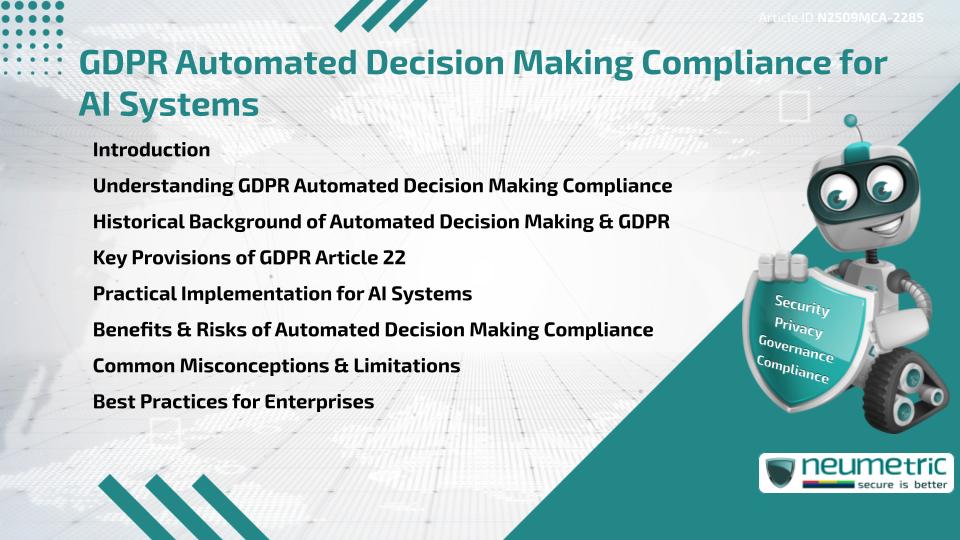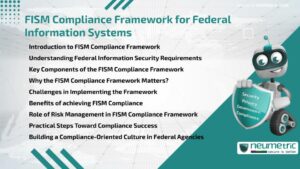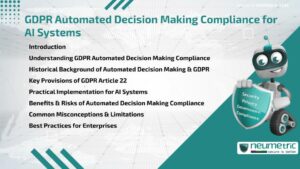Table of Contents
ToggleIntroduction
GDPR Automated Decision Making Compliance ensures that enterprises using Artificial Intelligence [AI] systems respect individuals’ rights while processing Personal Data. Article 22 of the General Data Protection Regulation [GDPR] places limits on decisions made solely by automated means, especially where these decisions have legal or significant effects on individuals. For enterprises, GDPR Automated Decision Making Compliance is not only a Legal requirement but also a Framework for building Trust, Fairness & Transparency in AI Systems. This article examines the history, key provisions, practical strategies, benefits, challenges & Best Practices of Compliance.
Understanding GDPR Automated Decision Making Compliance
Automated Decision Making involves systems making choices without human involvement. Examples include credit scoring, recruitment algorithms & automated Fraud Detection. GDPR Automated Decision Making Compliance ensures that such systems are Transparent, Accountable & respectful of Individual rights. It emphasises safeguards such as human intervention, the right to contest decisions & the need for clear explanations of automated outcomes.
Historical Background of Automated Decision Making & GDPR
Automated decision making is not new-it has existed since early credit scoring systems in the twentieth century. However, the rise of AI brought more complex & impactful use cases. Before GDPR, few Legal frameworks specifically addressed the Risks of automated decisions. With the regulation’s enforcement in 2018, enterprises faced stricter Accountability, ensuring that technology-driven decisions do not compromise individual freedoms.
Key Provisions of GDPR Article 22
Article 22 of the GDPR highlights critical rules for Compliance:
- Individuals have the right not to be subject to decisions made solely by automated means if such decisions significantly affect them.
- Exceptions exist where automated decisions are necessary for contracts, authorised by law or based on explicit consent.
- Enterprises must provide safeguards like human intervention, transparency & clear explanations.
These provisions are central to GDPR Automated Decision Making Compliance for AI Systems.
Practical Implementation for AI Systems
To align AI Systems with GDPR Automated Decision Making Compliance, enterprises should:
- Conduct Data Protection Impact Assessments [DPIAs] before deploying automated decision tools.
- Provide human oversight to review significant automated outcomes.
- Design explainable AI Models that can clarify how decisions are made.
- Document consent mechanisms where decisions rely on User permission.
- Regularly Audit algorithms to ensure fairness & prevent bias.
These practices help balance innovation with accountability.
Benefits & Risks of Automated Decision Making Compliance
The benefits of GDPR Automated Decision Making Compliance include enhanced Transparency, reduced Legal Risks & stronger Customer Trust. Enterprises that adopt Compliance also differentiate themselves by showing ethical responsibility in AI use.
Risks, however, include the complexity of aligning technical AI Models with legal requirements, potential costs of implementing safeguards & the difficulty of balancing innovation with regulatory limits.
Common Misconceptions & Limitations
One misconception is that GDPR bans Automated Decision Making entirely. In reality, it regulates its use & ensures safeguards. Another misconception is that simple disclaimers meet Compliance-while in fact, enterprises must provide detailed, understandable explanations & avenues for human review. A limitation is that GDPR does not prescribe exact technical methods, leaving enterprises with flexibility but also uncertainty in implementation.
Best Practices for Enterprises
Enterprises can strengthen GDPR Automated Decision Making Compliance by:
- Embedding Privacy & Fairness into AI design from the start.
- Training staff to understand both Technical & Legal aspects of Compliance.
- Communicating clearly with individuals about how decisions are made.
- Establishing robust oversight committees for AI Governance.
Takeaways
- GDPR Automated Decision Making Compliance protects individuals from unfair or opaque AI-driven outcomes.
- Article 22 gives individuals the right to challenge decisions made solely by automated means.
- Compliance requires Transparency, Explainability & Human oversight.
- Tools & Governance frameworks simplify Compliance monitoring.
- Balancing innovation with safeguards is critical for enterprises.
FAQ
What is GDPR Automated Decision Making Compliance?
It is the process of ensuring AI Systems follow GDPR Article 22 by safeguarding individuals against decisions made solely by automated means.
Does GDPR ban Automated Decision Making?
No, it regulates it & requires safeguards such as human intervention & transparency.
What rights do individuals have under Article 22?
They have the right not to be subject to significant automated decisions without safeguards & can contest or request explanations.
How can enterprises implement Compliance in AI Systems?
By using Data Protection Impact Assessments, human oversight, explainable AI Models & regular Audits.
What are the main challenges for enterprises?
Challenges include aligning complex AI Models with GDPR requirements, maintaining transparency & managing implementation costs.
Why is Compliance important for Customer Trust?
It shows Transparency, Fairness & Accountability, which strengthen Customer confidence in enterprise AI use.
Need help for Security, Privacy, Governance & VAPT?
Neumetric provides organisations the necessary help to achieve their Cybersecurity, Compliance, Governance, Privacy, Certifications & Pentesting needs.
Organisations & Businesses, specifically those which provide SaaS & AI Solutions in the Fintech, BFSI & other regulated sectors, usually need a Cybersecurity Partner for meeting & maintaining the ongoing Security & Privacy needs & requirements of their Enterprise Clients & Privacy conscious Customers.
SOC 2, ISO 27001, ISO 42001, NIST, HIPAA, HECVAT, EU GDPR are some of the Frameworks that are served by Fusion – a SaaS, multimodular, multitenant, centralised, automated, Cybersecurity & Compliance Management system.
Neumetric also provides Expert Services for technical security which covers VAPT for Web Applications, APIs, iOS & Android Mobile Apps, Security Testing for AWS & other Cloud Environments & Cloud Infrastructure & other similar scopes.
Reach out to us by Email or filling out the Contact Form…





